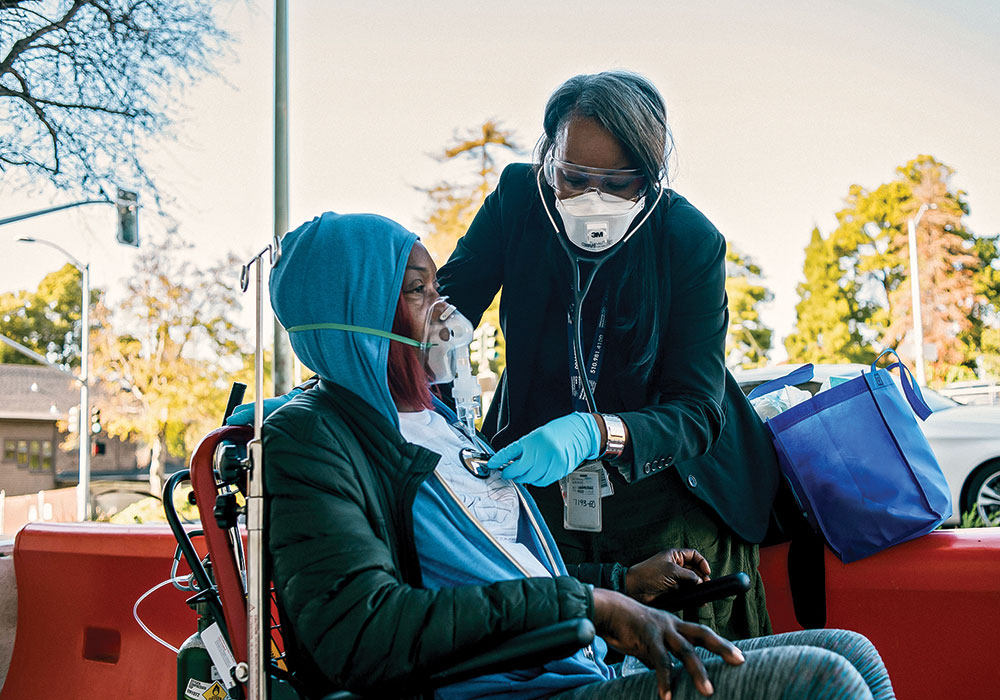Planning August/September 2020
Equity
Racism Is a Public Health Crisis, Local Governments Declare
Decades of research confirms what COVID-19 statistics show: Racism is the leading cause of health inequities. How will states and cities respond?
By Christine Vestal
Being black is bad for your health, and pervasive racism is the cause. That's the conclusion of multiple public health studies over more than three decades.
"We do know that health inequities at their very core are due to racism," says Dr. Georges Benjamin, executive director of the American Public Health Association. More recently, research has shown that racial health disparities don't just affect poor Black Americans, but they also cross class lines, he says. "As a Black man, my status, my suit and tie don't protect me."
The data is stark: Black women are up to four times more likely to die of pregnancy-related complications than white women. Black men are more than twice as likely to be killed by police as white men. And the average life expectancy of Black Americans is four years lower than the rest of the U.S. population.
The bleak statistics have helped convince more than 20 cities and counties and at least three states — Michigan, Ohio, and Wisconsin — to declare racism a public health crisis.
Supporters say the designations are meant to spur changes across all sectors of government — including criminal justice, education, health care, housing, transportation, budgets and taxes, economic development, and social services — with the goal of shrinking the health gap between Black and white Americans. But the declarations generally do not prescribe specific actions or allocate money, which is why some critics say they don't go far enough.
Still, public health officials welcome the declarations.
"When I talked about racism as a public health issue, it was a rallying cry, a theme that we would convene our stakeholders around, not only the health department but also our partners, and really start addressing issues with a racial lens," says Dr. Leana Wen, emergency physician, public health professor at George Washington University, and the former Baltimore Health Commissioner.
The American Medical Association, the American Academy of Pediatrics, and the American College of Emergency Physicians have all declared institutional racism an urgent public health issue in statements.
Higher rates of poverty, unemployment, poor housing, and toxic environmental exposure; less access to quality medical care; and implicit biases among health workers contribute to poor overall health in many Black communities. But after class and poverty are accounted for, Black Americans still have worse health outcomes than whites. Public health studies have shown that the racism Black Americans experience in their daily lives creates stress that affects their internal organs and overall physical health, resulting in a higher prevalence of chronic diseases and shorter lifespans.

A respiratory therapist cares for a patient in Oakland, California, where a COVID-19 Racial Disparities Task Force was created in May. Race is a huge factor in virus fatality rates due to "long-standing systemic health and social inequities," the CDC says. Photo by Alexandra Hootnick/The New York Times.
Naming the problem
By all accounts, Wisconsin was the first state where local governments declared racism a public health emergency. The first to do so was Milwaukee County last year, home to Milwaukee, one of the most segregated cities in the country.
According to Nicole Brookshire, director of the county's Office on African American Affairs, more than 4,000 county employees, including judges and police, have since received racial equity training. The county has also developed a budgeting tool its agencies must use to ensure that expenditures, budget cuts, and capital investments are racially equitable.
In Maryland this past June, council member Will Jawando asked the Montgomery County Council to declare racism a public health emergency. "People tend to think of racism as an individual thing that's regrettable," he says. "But they don't connect the 400-plus years of systemic, legal racism that leads to death for many Black people." He plans to follow up with a proposal to change police regulations by raising the standard for justifiable use of deadly force and requiring police to intervene if they see another officer wrongfully using force.
"Whether it's police-involved killings or disparate health outcomes where Black patients can't get treatment because they're not seen as being sick, or financial redlining in certain ZIP codes, food deserts, or people of color getting hit by cars more often because their communities aren't walkable, it's ultimately due to racism," Jawando says.
The county's health director, Dr. Travis Gayles, says the public health emergency declaration is intended to go beyond combating blatant racism to address the implicit bias he says exists in every sector of the government. "I don't think implicit bias will magically disappear," he says. "But the legislation forces the conversation to be had."
Benjamin, the public health association director, says the rising tide of local public health declarations across the country could mark the beginning of better health outcomes for people of color.
"You can't solve a problem until you define it. So, the first step, the first thing you must do is name racism. Name it when you see it. You've got to call it for what it is," he says. "If it hurts people, if it kills people, it's a public health issue."
Christine Vestal is a staff writer for Stateline. This story was reprinted with permission from Stateline, an initiative of The Pew Charitable Trusts.


